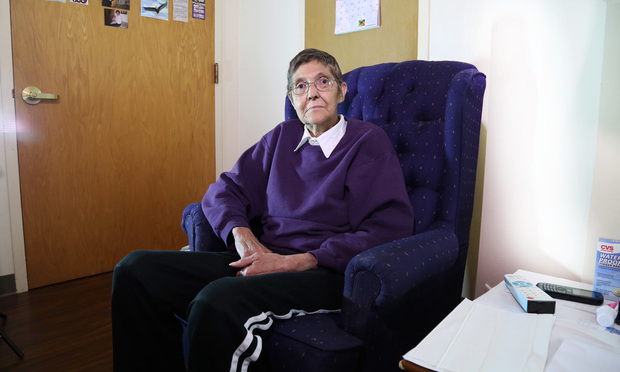 Golden Gate Bridge
Golden Gate Bridge
California’s bar has long struck me as something of a racket.
By refusing reciprocity or admission on motion, it sends a message: Your out-of-state bar exams just aren’t as good as ours. Because California is special. (Oh, and did I mention it’s currently 76 and sunny here?)
Still, there’s no reason to be obnoxious about it.
Which is why I applaud a petition filed Tuesday with the U.S. District Court for the Northern District of California by 11 groups including the ACLU, the Cato Institute, the Association of Corporate Counsel and Earthjustice. They’re asking the federal court to do away with a rule that requires lawyers who appear before them to be members of the California Bar.
True, you can appear pro hac vice, but it costs $310 per lawyer per case—even for an amicus or objecting class member or in connection with subpoenas issued in litigation in a different district.
If you’re from a big firm, $310 is pocket change. But for nonprofits, it’s a burden.
It’s also kind of pointless. “The requirement for California Bar admission does not bear any reasonable relationship to the actual practice in this court because the procedures followed are established by federal rules and the issues in the vast majority of the cases in this court arise under federal, not California law,” the petition states.
Having to take the California Bar—even the so-called attorneys’ exam for lawyers who are already admitted elsewhere is still six and a half hours, with five essay questions and a “performance test” – “imposes unjustified burdens of time and money,” the petition states. Especially if the only reason you’re doing it is to practice in one of California’s four federal district courts.
“In addition, once admitted, a lawyer must continue to be an active dues-paying member of the California Bar to remain a member of the bar of this court, even when a lawyer does not regularly practice in California,” the petition continues. “These burdens are wholly out of proportion to any possible benefit that might be realized for clients and the court from imposing such a requirement.”
I’m all in favor of rigorous bar exams and high standards for attorneys. But I can tell you from first-hand experience that there are some dreadful lawyers in California who managed to pass the state bar anyway. Conversely, in places like Washington D.C., which has a downright promiscuous policy on reciprocity, the quality of legal representation does not seem to suffer.
All the more reason for California’s federal courts to ease up and stop shaking down lawyers from outside the Golden State.
See also: California Federal Courts Are Urged to Open Wider Door to Out-of-State Lawyers
Lesbian Senior Seeks to Break New Ground in Seventh Circuit Appeal
 Marsha Wetzel
Marsha Wetzel
“The elderly deserve to be treated with respect and to feel safe no matter who they are or who they loved and I’m going to fight for us.”
That’s the rallying cry from plaintiff Marsha Wetzel, a lesbian senior citizen who sued her living facility for refusing to act on her complaints of pervasive harassment, discrimination and violence from other residents.
On Tuesday, the U.S. Court of Appeals for the Seventh Circuit heard her appeal in a case of first impression in the circuit. The key question: Can a landlord be held liable for failing to put an end to tenant-on-tenant harassment?
“Over and over, she made the defendants aware of this harassment,” Wetzel’s lawyer, Karen Loewy, senior counsel and seniors program strategist for Lambda Legal, told the panel. She called the abuse at Glen St. Andrew Living Community, a for-profit senior living facility in Niles, Illinois, “relentless.”
Wetzel was allegedly called names like “fucking dyke,” physically attacked twice by other residents and was afraid to use the common areas in the facility as a result.
The U.S. District Court for the Northern District of Illinois dismissed her case on January 18, 2017 without reference to the sex or sexual orientation claims.
Loewy in her argument to Chief Judge Diane P. Wood and circuit judges Michael S. Kanne and David F. Hamilton said that the Fair Housing Act imposes an obligation on the landlord to act in the face of such abuse. The AARP and the National Fair Housing Alliance both backed Wetzel as amici on appeal.
But Hamilton called Loewy’s theory “a pretty dramatic extension. This is all essentially brand-new.”
Wood, however, seemed distinctly sympathetic. And she gave Lisa A. Hausten of Clausen Miller, who represented the senior living facility, a tough time.
In an exchange that reversed the normal oral argument roles, Hausten asked Wood, “Is there a duty of a landlord to intervene in a private dispute?”
“Yes,” Wood answered. “When a private dispute means someone … on the basis of a protected characteristic is being physically assaulted in a common area of the facility. How can there not be a duty to intervene? Would you be making this same argument if a racist tenant was physically assaulting an African American?”
“I think the police can intervene, the victim can bring action against the harasser,” Hausten said.
Wood’s response: “That’s a wild theory. The landlord can stand there and watch someone pummel someone else because of their religion, because of their race?”
A $10M Defense Win in a Tragic Case
It’s hard to truly revel in winning at trial when your opponent is a horribly burned child.
Still, lawyers from Tyson & Mendes convinced a federal jury in San Diego that the injury was not their client’s fault.
Managing partner Robert Tyson and San Diego partner Kristi Blackwell represented children’s clothing manufacturer Schwab Company, which was sued along with Macy’s and Ralph Lauren after a young boy suffered third-degree burns on his torso and 30 percent of his body.
Jesus Romero, age 8, was allegedly playing with a lighter in a neighbor’s yard when his Ralph Lauren shirt caught fire. Represented by Boucher LLP and Gomez Trial Attorneys, the plaintiffs claimed the fabric “was not ’100% Cotton’ as its label indicated, but instead was a highly flammable, dangerous, and unlawful blend of cotton and synthetic fibers.” They asked for $10 million in damages.
Macy’s and Ralph Lauren, represented by Manning & Kass Ellrod Ramirez Trester and Jeffrey M. Lenkov, settled for hundreds of thousands of dollars, but Schwab went to trial.
The Tyson & Mendes trial team focused on showing that the shirt met all required federal manufacturing standards, questioned whether evidence conclusively proved the shirt in question was even made by Schwab, and argued that some responsibility should be placed on the lack of awareness and oversight by the child’s parents.
“We believe the legislature is the correct forum to bring about changes to federal clothing manufacturing and fire testing guidelines, but plaintiff’s counsel asked the jury to find the federal standards were not enough,” Tyson said in a written statement. “While plaintiff did sustain life-changing injuries, the jury saw the unreasonableness of this ask, and ultimately agreed our product was safe for children.”
What I’m Reading
Lying Witness or Not, Merck Might Salvage $200M Verdict in Hep C Battle
A juicy tale involving star litigators, a hefty patent infringement verdict and a lying patent prosecutor.
Thick Skin: Defense Lawyers Explain How They Handle Attacks on their Work
“I have never faulted someone for exploring all the appellate rights that they have. … If that includes looking at my performance at the trial, I encourage them to do that.”
State AGs Take EPA to Court Over Clean Water Rule
Don’t you think the phrase “arbitrary and capricious” rolls wonderfully off the tongue?
9th Circuit Approves $25M Trump University Settlement
Under the deal, more than 8,000 class members would get up to 90 percent of what they paid in Trump University real estate courses.
Defense Verdict in Case of Man Left With Denture Stuck in Throat at Care Center
Basically everything about this case is horrifying.
Tips for Handling a Call from the FBI
News you hope you can’t use—except it’s becoming more common for the FBI to interview attorneys to ask questions about a client who may be the subject of an investigation.
With the Three R’s, Here’s How Williams & Connolly’s Deneen Howell Powers Through Her Day
Loving this intimate look by Leigh Jones at the life of a superstar D.C. lawyer, plus her husband—a partner at Skadden—their two kids, and don’t forget the two goldfish.


